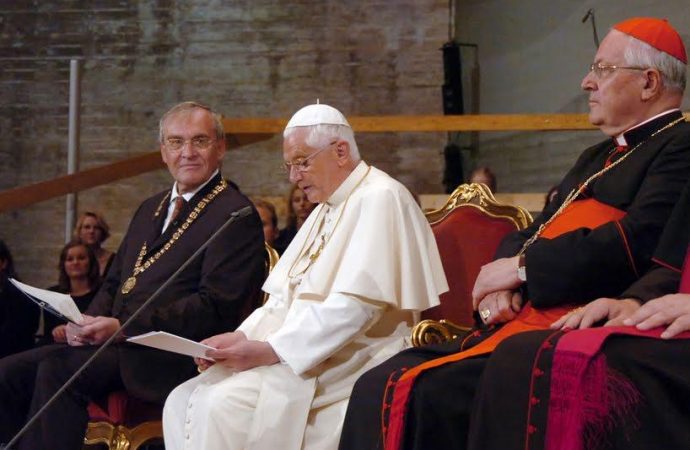John Allen skriver om denne talen i det berømte universitet i Regensburg i Tyskland, at: «In the opening section of the speech, Benedict cited a 14th century dialogue between a Byzantine emperor and a Persian, in which the emperor said provocatively: “Show me just what Mohammad brought that was new, and there you will find things only evil and inhuman, such as his command to spread by the sword the faith he preached.”»

Det ble en hel del bråk etter den talen, men Allen sier at man nok skylder pave Benedikt en unnskyldning, for: «Ten years later, there’s a mounting sense that perhaps the world owes Benedict an apology. The rise of the Islamic State, Al-Shabaab, Boko Haram, and other extremist Islamic movements, and the continual waves of terror and barbarism they generate, has created a sense that perhaps it wasn’t Benedict who stumbled by pointing out that Islam has a problem – perhaps it’s Muslims who haven’t responded to the problem adequately.»
Men aller viktigst, skriver John Allen: «Lost in the noise, however, is the central thing to know about the Regensburg speech, to wit: It’s not really about Islam at all.» Og han fortsetter:
… In the 4,500-word address, Benedict devoted barely three paragraphs to the remark quoted above from Manuel II Paeologus, which he used to set up his reflections on the topic, which was “Faith, Reason and the University.” He was trying to make a point about the importance of religion never parting company with reason, and could just as easily have taken his cautionary tale from Hinduism, Buddhism, or, for that matter, Christianity.
Benedict’s real target in the speech is the West, identifying two worrying trends he saw (and no doubt still sees) in Western thought – one inside the Christian church, and the other in the broader culture.
He devoted a significant chunk of the Regensburg speech to tracing the history of efforts at “dehellenization,” meaning to suggest that the use of ancient Greek concepts of reason in the early Church was really just an historical accident, and there’s nothing essential about them to the Christian faith.
Benedict insists that salvation history doesn’t work that way, and that it was providential that the Biblical faith and Greek thought intersected. It marked a fundamental choice by Christianity, he believes, to recognize that reason is intrinsic to God’s nature, and that to act irrationally is therefore to break with God’s will.
Benedict was even more critical of trends in Western culture to regard only the so-called “hard sciences” as truly rational, meaning objective, and to relegate everything else – including morality – to the realm of personal preference and choice.
That’s a disaster, he argued, because it leaves no basis for moral consensus on anything, and thus makes building a real community impossible. If there’s no objective good, then what’s to stop the powerful from abusing the weak, what’s to stop a tyrannical majority from oppressing a minority, and on and on? …
